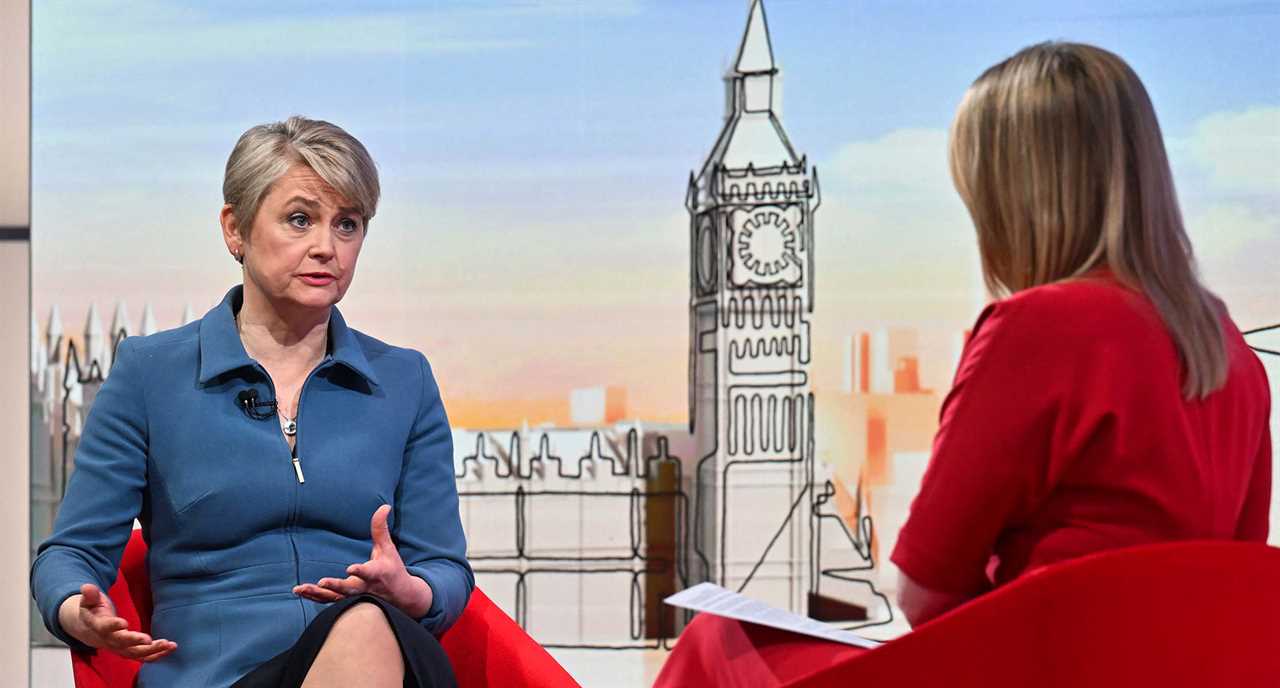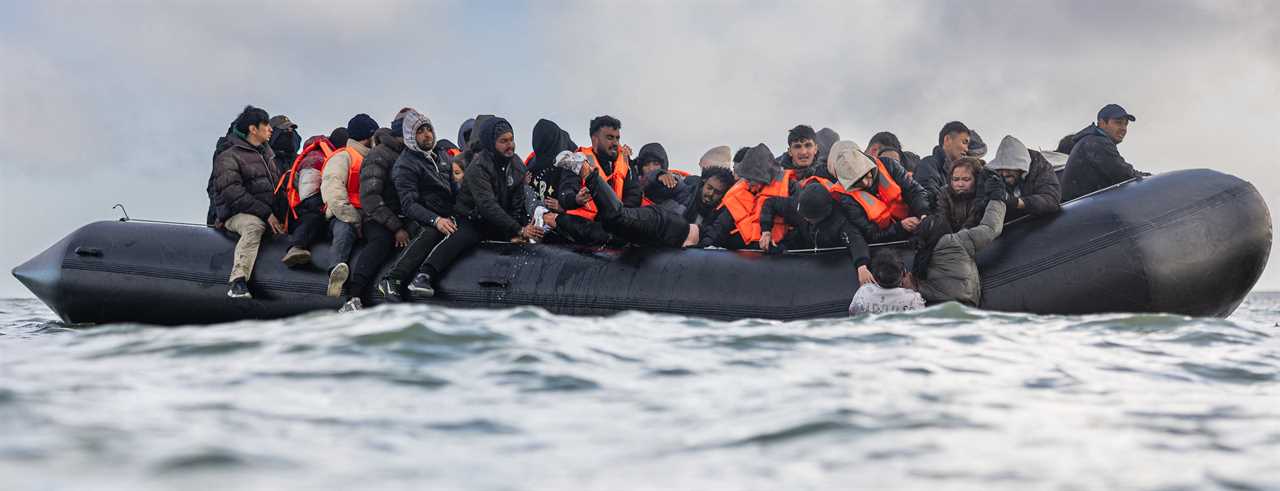
Audio Summary of the Article
Home Secretary Blames Criminal Gangs
Britain's capacity to halt illegal migrants breaching the English Channel in small vessels is increasingly reliant on adverse weather conditions, Home Secretary Yvette Cooper acknowledged yesterday.
Record-Breaking Crossings Loom
This year is progressing towards potentially the highest number of illegal Channel crossings on record, with over 6,600 arrivals so far. Calais remains a significant hotspot, where migrants express unwavering determination to reach UK shores despite the dangers.
Labour Government Faces Criticism
With Labour in power, the total number of arrivals is expected to exceed 30,000 this week. Prime Minister Sir Keir Starmer is set to lead an international summit focused on dismantling people smuggling operations, which he describes as pits nations against each other and exploit political disunity for profit.
Strategic Responses to the Crisis
In his upcoming speech in London, Starmer intends to draw parallels between his past work as Director of Public Prosecutions and the current battle against organised immigration crime, emphasising the need for cross-border collaboration, intelligence sharing, and comprehensive tactics to address the issue at every level.

Dependence on Weather Highlights Security Flaws
During an appearance on the BBC's "Sunday with Laura Kuenssberg" show, Cooper criticized the current border security measures, highlighting that criminal gangs have undermined the system to the extent that weather conditions now significantly influence the number of successful crossings. "We cannot continue like this, where the number of calm days affects the number of crossings," she stated.
International Efforts Intensify
In preparation for the summit, Cooper emphasised the necessity of a unified global response along the entire migration route to effectively challenge smuggling networks. The Home Office has allocated nearly £1 million to anti-smuggling initiatives in Iraq, marking continued cooperation with the Kurdistan Region of Iraq’s law enforcement. This collaboration led to the arrest of three prominent members of a smuggling syndicate targeting the UK.
Shadow Government Rebukes Labour's Approach
Shadow Home Secretary Chris Philp condemned the government's strategy, suggesting that Labour's reliance on unpredictable weather is insufficient. He criticised the cancellation of the Rwanda removals plan and criticised Starmer's border control measures as ineffective.
Migrant Stories Highlight Persistent Risks
At the Loon-Plage camp in Calais, migrants conveyed their resolve to undertake the dangerous journey regardless of the weather conditions. Afghan Ali Hussein, 29, expressed his readiness to face adverse weather for the chance to reach the UK. Similarly, a Syrian man known as Badar and 19-year-old Mustapha from South Sudan affirmed their determination to risk the perilous crossing.
The UK's Ongoing Battle Against Illegal Crossings
Despite Labour’s promises to tackle the financial gains of smuggling operations, nearly 30,000 illegal migrants have still entered the UK since the current government took office. Additionally, concerns have arisen over the safety of asylum seekers, with reports indicating that a fifth of small boat applicants did not adhere to basic rules last year, raising fears of migrants potentially disappearing within the UK.
Looking Ahead to the International Summit
Prime Minister Starmer's leadership in the upcoming two-day summit signals the UK’s commitment to addressing the illegal Channel crossings. The focus will be on dismantling smuggling networks through international cooperation, intelligence sharing, and coordinated efforts across nations to reclaim control over border security.
Frequently Asked Questions
What are civil rights?
Civil rights are the rights that protect individuals' freedoms from infringement by governments, social organizations, and private individuals. These rights include the right to free speech, freedom of religion, and the right to due process.
What is the role of the judiciary in politics?
The judiciary interprets and applies the law, ensuring justice and upholding the constitution. It serves as a check on the powers of the legislative and executive branches, protecting individual rights and maintaining the rule of law.
What is the significance of public opinion in politics?
Public opinion reflects the attitudes and beliefs of the populace regarding political issues and leaders. It can shape policy decisions, influence electoral outcomes, and motivate politicians to respond to the needs and concerns of their constituents.
How does lobbying influence politics?
Lobbying involves advocating for specific interests or causes to influence lawmakers and policy decisions. While lobbying can provide valuable information to legislators, it can also lead to concerns about undue influence and corruption.
Statistics
- In 2022, over 30 countries experienced significant protests related to political issues, highlighting a global trend of civil unrest and demands for accountability.
- Polling data indicates that over 50% of Americans support the idea of ranked-choice voting as a method to improve electoral fairness.
- Approximately 90% of political campaigns in the U.S. utilize social media as a primary tool for outreach and engagement with voters.
- As of 2023, public trust in government institutions has declined, with only 20% of citizens expressing confidence in their national governments.
- According to recent studies, around 75% of Americans believe that campaign financing significantly impacts election outcomes.
- Surveys show that nearly 70% of voters prioritize environmental issues when selecting candidates for public office.
- As of 2023, approximately 25% of countries have implemented some form of digital voting, reflecting the shift towards technology in the electoral process.
- Approximately 60% of eligible voters in the United States participated in the 2020 presidential election, marking the highest turnout rate in over a century.
External Links
How To
How To Participate in Political Debates
Participating in political debates requires preparation and composure. Begin by researching the topics to be discussed, ensuring you have a solid understanding of various perspectives. Prepare your arguments and anticipate counterarguments, allowing for a well-rounded discussion. Practice articulating your points clearly and confidently. During the debate, listen actively to others and respond thoughtfully, maintaining respect even in disagreement. Engaging with the audience and using credible evidence to support your claims can enhance your effectiveness in the debate setting.
 PoliticsRoyaltySoap OperaGamingMoneyPrivacy PolicyTerms And Conditions
PoliticsRoyaltySoap OperaGamingMoneyPrivacy PolicyTerms And Conditions
